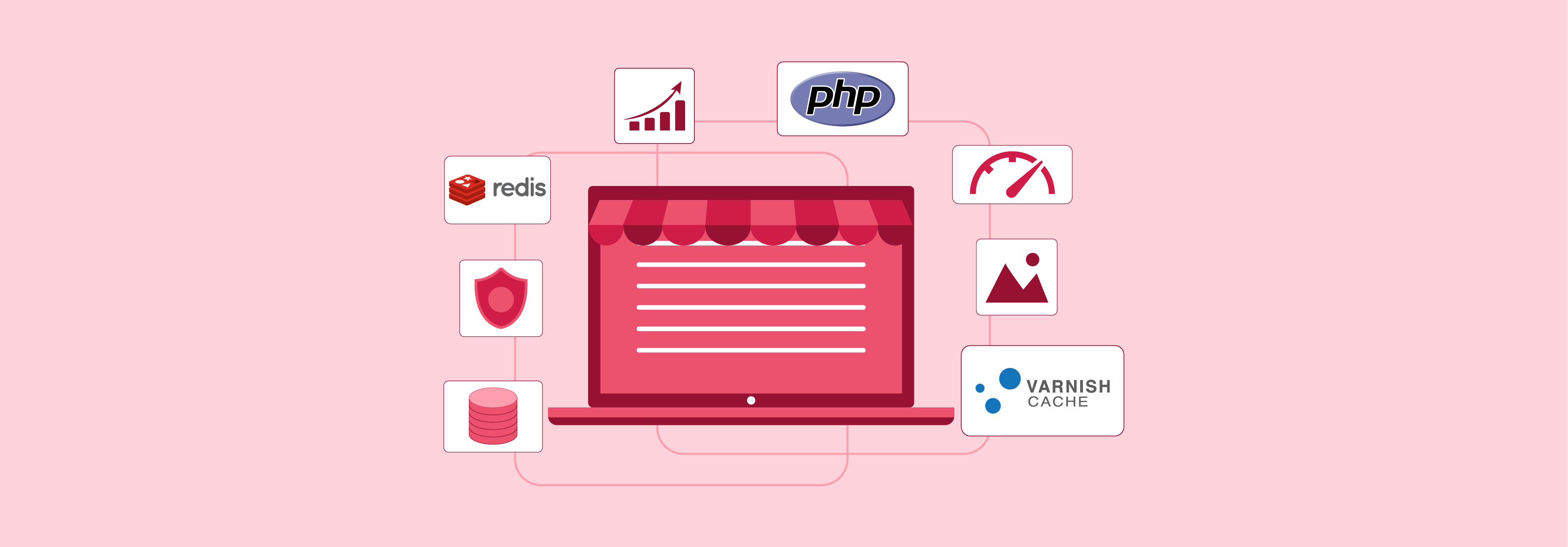
Best Magento Hosting Software for Your Business Needs
How does Magento hosting software benefit your business? Most visitors exit the website if it takes more than 3 seconds to load. Understanding server stack, security, scalability, and other key factors can impact your store's success. This article explores Magento hosting software, key considerations for opting, and optimization evaluation.
Key Takeaways
-
Explore Magento hosting software and evaluate key considerations.
-
Discover server health, CDN benefits, and security regulations for informed decisions.
-
Explore Advanced monitoring, backup and recovery, Secure Shell access, Git integration, and staging environments for a successful store.
-
Learn about caching, scalability, security, monitoring, developer tools, and reliable support for optimized hosting solutions.
What is Magento Hosting Software?
Magento hosting software provides server infrastructure, enhanced security measures, and performance optimization tools. It ensures a secure and high-performing online store environment.
Key Considerations for Evaluating a Magento Hosting Software
1. Server Infrastructure
Server Stack
It is the software stack required to host and run Magento, which includes:
-
Web Servers like Apache, Nginx, or LiteSpeed.
-
Database: Magento supports databases like MySQL, MariaDB, and Percona.
-
PHP: Check for a compatible PHP version(e.g., PHP 7.x).
-
Operating System: Magento can run on various operating systems, including Linux distributions.
-
Caching Solutions: Implementing caching solutions like Varnish or Redis can enhance Magento's performance.
Hardware Resources
Assess the available hardware resources. This includes processing power, memory (RAM), and storage capacity. Ensure the provider offers adequate resources to handle the anticipated traffic and data needs of your store.
2. Content Delivery Network (CDN) Integration
Consider the availability of CDN integration within the hosting plan. A CDN distributes website content across geographically dispersed servers. It helps in improving loading times for users in different locations. Using CDN, you can ensure:
Faster Loading Times
CDNs store website assets (images, code) globally, serving them from the nearest server. This reduces data travel distance, resulting in quicker page loads.
Reduced Server Load
CDNs handle content delivery, lessening the burden on your origin server. This improves website performance and stability, especially for global audiences.
Traffic Spikes
It can manage sudden traffic surges by distributing the load across its network, preventing website slowdowns.
SEO Advantage
Faster loading times, a factor considered by search engines, can potentially improve your website's ranking.
Enhanced Security
Many CDNs offer security features like DDoS protection to safeguard your website from malicious attacks.
Data-Driven Optimization
Monitoring tools offered by CDNs provide valuable data on server health, uptime, traffic patterns, and user behavior. This data empowers you to:
Identify Resource Needs
Track server metrics (CPU, memory) to assess if your hosting plan meets your website's demands. Upgrading or optimizing your application may be necessary if resource usage is consistently high.
Proactive Problem Solving
Identifying performance issues proactively through monitoring allows you to address them before they impact your customers' experience.
2. Scalability

As your business grows, your online store will experience an increase in traffic and data demands. Choosing a scalable solution allows you to add more resources as needed easily. Explore options for seamless vertical scaling or horizontal scaling.
3. Security

E-commerce websites handle sensitive customer data. Robust security features are essential to protect your store and your customers' information. Look for providers that offer:
-
Secure Sockets Layer (SSL) certificates for encrypted communication.
-
Firewalls to filter incoming and outgoing traffic, preventing unauthorized access.
-
Regular security audits and vulnerability scanning to identify and address potential security risks.
-
Intrusion detection and prevention systems (IDS/IPS) for real-time monitoring.
4. Backup and Recovery

Unforeseen events can disrupt website operations. Look for automated backups at regular intervals and quick restoration when needed.
5. Advanced Monitoring and Analytics

Consider providers with integrated monitoring tools that provide data on server health, website uptime, traffic patterns and user behavior.
Maximize Performance
Monitor server health metrics like CPU usage, memory consumption, and disk I/O. This allows you to identify potential resource bottlenecks before they impact website performance. If you see consistently high usage, it might be time to upgrade your hosting plan or optimize your Magento application to reduce resource demands.
Ensure Availability
Website uptime has to be consistent. Monitoring tools track uptime, alerting you about any downtime occurrences. This minimizes downtime and potential lost sales due to website inaccessibility.
Optimize Resources
Analyze traffic patterns to understand peak visitor hours and demographics. This data helps you allocate resources effectively and target marketing efforts toward the right audience.
Enhance User Experience
Gain valuable insights into user behavior, such as popular pages and click-through rates. By understanding how users interact with your store, you can refine website design and functionality for an engaging shopping experience.
Informed Decisions
Leverage data from monitoring tools to make proactive decisions about resource allocation and website optimization. This data-driven approach ensures your Magento store runs efficiently and delivers a superior experience for your customers.
Identify Growth Opportunities
Analyzing user behavior data can pinpoint areas for improvement and identify opportunities to enhance customer engagement. Explore options that offer integration with popular analytics solutions like Google Analytics.
Google Analytics offers tracking website traffic, user demographics, and insights. While the free tier provides valuable data, premium features offer deeper insights.
Data Privacy Regulations
Data privacy regulations like GDPR and CCPA impact data collection and user tracking. Ensure you follow relevant regulations and get user consent where necessary.
-
Data Accuracy
Analytics tools rely on user data collected through cookies or other tracking methods. Certain users may block cookies or use privacy tools that impact data accuracy.
-
Data Interpretation
Analyzing data trends and user behavior patterns to gain actionable insights.
6. Customer Support
Check the provider's support options, including phone, email, chat, and knowledge base resources. Look for providers with expertise in troubleshooting Magento-specific issues.

Evaluating Magento Hosting Software for Optimization
1. Performance

PHP Version
PHP is the scripting language that powers the dynamic functionalities of your Magento store. Using the latest stable version of PHP offers several advantages:
-
Performance Optimization
Newer PHP versions can lead to faster page load times for your online store.
-
Enhanced Security
Security vulnerabilities are patched in newer PHP releases. Using the latest PHP version fixes security issues. It protects your Magento store from attacks.
Varnish Cache
Varnish Cache is a powerful caching tool that can improve website loading times. It acts as a temporary storage layer between your Magento store and website visitors. It stores frequently accessed static content (like images and HTML pages) in memory. When a returning visitor comes, Varnish serves cached content directly. It bypasses the need to fetch it from the server each time. This reduces page load times, leading to a more positive user experience.
Redis
Redis is an advanced key-value store that excels at caching dynamic data. It includes frequently accessed database queries, shopping cart information, and session data. By storing this data in memory, Redis reduces the load on your database server. This results in faster page load times and improved responsiveness.
2. SEO (Search Engine Optimization)
While SEO optimization primarily involves on-page content strategies. Some hosting providers offer tools that can indirectly contribute to better SEO. Look for options with features like server-side caching and clean URL structures. It can benefit search engine crawling and indexing.
3. Security
The security features such as SSL certificates and firewalls are essential for a secure online store. Additionally, consider providers that offer security tools like:
Web Application Firewalls (WAFs)
These firewalls act as an extra layer of security to protect websites. It guards against vulnerabilities and malware attacks. WAFs analyze incoming traffic and block any suspicious requests. These attempts can inject malicious code or exploit security weaknesses in your store.
DDoS (Distributed Denial-of-Service) Mitigation
DDoS attacks your website with a flood of traffic from malicious sources. This can render your store inaccessible to legitimate users. DDoS mitigation services can help absorb such attacks and maintain website uptime.
4. Next-Gen Backup and Disaster Recovery
Next-generation backup solutions offer automated efficiency for Magento store owners. These solutions ensure data integrity with features like incremental backups and version control.
Disaster recovery plans address threats like hardware failure and cyberattacks. Snapshot capabilities and offsite backup options like cloud storage further enhance data protection. Evaluating your needs in terms of data volume, recovery time, and budget helps you choose the optimal backup and DR solution.
5. Advanced Monitoring and Analytics

With real-time insights into server health metrics, you can enable informed decision-making. Customizable dashboards, alerts, and visualization capabilities help in performance optimization and future planning.
The following tools can help identify and address performance issues promptly.
Google Analytics
Google Analytics provides insights into website traffic, user behavior, and conversions. It can help track key metrics such as page views, bounce rates, conversion rates, and more. These insights enable you to make data-driven decisions and optimize marketing strategies.
New Relic
New Relic offers application performance monitoring (APM) solutions that provide real-time insights. It offers detailed metrics on server health, application response times, database queries, and more. With New Relic, you can identify performance bottlenecks and improve the overall user experience.
Grafana
Grafana is an open-source analytics and visualization platform. It allows you to create customizable dashboards for monitoring and analyzing data. With Grafana, you can visualize server metrics and application performance data in real time. Its flexible query language and extensive plugin ecosystem make it a versatile tool.
6. Developer-Friendly Environments
Developer-friendly environments aim to create conducive environments for Magento developers to work efficiently. These environments offer SSH access and Git integration to streamline workflow for the Magento site.
SSH Access
Secure Shell (SSH) access allows developers to connect to the hosting server. It permits the execution of commands remotely and securely. Developers can perform file management, server configuration, and application deployment tasks.
Git Integration
Git is a version control system used by developers. It manages code changes, supports collaboration, and tracks project history. Hosting with Git integration enables developers to integrate projects with Git repositories. This allows efficient version control, code collaboration, and deployment workflows.
Staging Environments
Staging environments are separate environments that mirror the production environment. It allows developers to test changes, updates, and new features before deploying. Developer-friendly hosting solutions often offer built-in staging environments or easy setup options. It enables developers to test and use Magento software configurations, extensions, and customizations.
7. Customer Support and Service Level Agreements (SLAs)

Reliable customer support minimizes downtime, boosts customer satisfaction, and aids in problem identification. When evaluating customer support, consider the following SLA aspects:
Uptime Guarantees
SLAs specify an uptime guarantee. It indicates the least percentage of time your website is expected to be operational. Aim for high uptime guarantees (99.9% or higher) to ensure website availability for customers.
Issue Resolution Timeframes
SLAs may define timeframes for resolving different types of support tickets. Look for clear definitions of priority levels and corresponding resolution timeframes.
Compensation for Downtime
Some SLAs offer financial compensation for exceeding downtime thresholds. This incentivizes the hosting provider to maintain high uptime standards.
Opt for providers offering 24/7 support across multiple channels and with fast response times.
8. Innovative Features for Enhanced User Experience
Check for options with server-side optimizations for faster loading times. Consider mobile responsiveness tools and user engagement features for data-driven optimization. These functionalities can improve conversion rates, reduce bounce rates, and increase customer satisfaction.
FAQs
1. What is the difference between Magento hosting and regular web hosting?
Regular web hosting plans may not be optimized for the specific needs of a Magento store. Magento hosting offers features like server-side caching, optimized databases, and pre-configured security measures. It is the hosting that lets you focus on your business, not server management.
2. What are some factors to consider when choosing a Magento web hosting provider?
When choosing a Magento hosting provider, consider hosting features like:
- Server infrastructure
- Scalability options for future growth
- Robust security features
- Reliable backup and recovery solutions
- Responsive customer support
- CDN integration and caching tools
3. What are the benefits of using a managed Magento hosting service?
Managed Magento hosting takes the burden of server management off your shoulders. The managed hosting provider handles tasks like server maintenance, security updates, software installations, and performance optimization.
4. How much does Magento hosting cost?
Costs for the Magento hosting platform can vary depending on the provider, plan features, and resource allocation. Prices range from $4 per month for basic shared hosting plans to hundreds of dollars per month.
5. Do I need a dedicated server for my Magento store?
Dedicated servers offer the highest level of control and resource allocation. However, shared hosting or VPS plans may be sufficient for small stores.
6. What are the performance benefits of optimized Magento hosting?
Optimized hosting for Magento offers features like caching and optimized databases that can significantly improve website loading times and overall performance.
7. How do I choose the best Magento web hosting providers?
Choosing the best Magento hosting providers involves evaluating:
- Current traffic volume
- Budget
- Desired features
- Scalability needs for projected growth.
8. How do I choose the right hosting solution with Magento 2?
Magento allows you to customize your store extensively. But, to ensure a smooth operation, you'll need specialized hosting. Standard ecommerce hosting providers might not offer the resources or optimized environment your Magento site demands. Here's what to consider when choosing a Magento Hosting plan:
-
Server Infrastructure: Look for hosting companies with robust server infrastructure specifically optimized for Magento applications.
-
Magento Expertise: Find a provider with a team of Magento experts. This ensures dedicated support for a smooth Magento hosting experience.
-
Scalability: Choose a plan that allows you to upgrade resources easily. You will need more storage and processing power as your business grows.
-
Customization Options: Several Magento hosting plans provide functionalities for enhanced customization. These functionalities include server-side caching and database optimization features.
Summary
Discover how Magento hosting software can elevate your online store. Here's a concise guide to key considerations and optimization strategies:
-
Infrastructure: Ensure a strong server stack, sufficient hardware resources, and CDN integration for improved performance and accessibility.
-
Performance Optimization: Optimize with the latest PHP version, caching tools like Varnish Cache, and Redis for enhanced speed and responsiveness.
-
Security: Prioritize security features such as SSL certificates, firewalls, and DDoS mitigation to protect customer data and prevent cyber threats.
-
Developer-Friendly Environments: Choose hosting environments with SSH access, Git integration, and staging options for efficient development workflows.
-
Customer Support and SLAs: Look for providers offering reliable support, high uptime guarantees, and efficient issue resolution.
By considering these factors, you can make informed decisions to support the growth and success of your Magento store. Explore these Magento managed hosting plans to stand out with a strong foundation.




